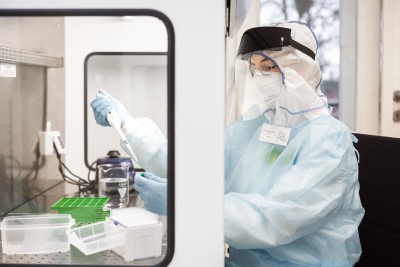City of Vienna Partner Lab Massively Expands Covid-19 Laboratory
The Lifebrain laboratory, which partners with the City of Vienna, is undergoing a massive expansion on its COVID-19 laboratory. This expansion comes just weeks after an unfair competition lawsuit brought against Lifebrain by the Vienna Medical Association was dismissed. Read about Lifebrain's lab expansion and legal issues.
 Lifebrain's laboratory can now test for the new coronavirus Omicron variant. / Picture: © Lifebrain COVID Labor GmbH / Philipp Lipiarski & Peter Hautzinger
Lifebrain's laboratory can now test for the new coronavirus Omicron variant. / Picture: © Lifebrain COVID Labor GmbH / Philipp Lipiarski & Peter Hautzinger
Lifebrain, the company currently responsible for an overwhelming share of the COVID-19 testing in Austria, will massively expand its laboratory location at Klinik Penzing, 1140 Vienna.
In addition to the existing two pavilions, 16 (logistics) and 17 (high-tech COVID-19 laboratory on three floors, with 118 PCR analyzers and 144 pipetting robots), Lifebrain is significantly expanding the logistics and laboratory capacity with two additional pavilions renovated from the ground up and converted into a laboratory.
This will increase the daily maximum testing capacity to approximately 750,000 PCR tests by early 2022.
At the same time, the number of employees will be increased by up to 600 to a total of more than 1,500. Around € 18 million will be invested in the expansion.
This massive expansion comes only a few weeks after the Commercial Court of Vienna dismissed an unfair competition lawsuit against Lifebrain that was brought forth by the Vienna Medical Association.
Completion of expansion by mid-December
Currently, preparations for the capacity expansion are in full swing.
The necessary construction measures for the two new pavilions should be completed by mid-December.
This includes the renovation of the completely outdated infrastructure, the laying of around 50 km of data lines per pavilion, a separate power supply by Wien Energie, emergency power generators, and the creation of a hygienically clean, germ-free atmosphere for PCR tests and sequencing.
After that, the highly sensitive laboratory equipment, which is currently in enormous demand on the world market and thus difficult to obtain, must be installed, connected, and put through its paces.
At the same time, new staff members are already being recruited and trained.
With a total of four pavilions on the Baumgartner Höhe in Vienna, the Lifebrain laboratory will be by far the largest COVID-19 laboratory in Europe.
Testing for Omicron
The laboratory, which currently specializes in COVID-19 analyses, is also a pioneer in other testing areas.
For example, sequencing to detect different mutations of the COVID-19 virus also takes place at Baumgartner Höhe, with around 1,000 examinations every week.
Lifebrain is now also able to test samples with positive results for possible infection with the new Omicron mutation by PCR melting curve analysis and new test kits.
If Omicron is suspected, then sequencing of the relevant samples takes place.
Lawsuit
Lifebrain’s expansion of the laboratory is happening just as the company had an unfair competition lawsuit dismissed in the Vienna Commercial Court.
Earlier this year, the Vienna Medical Association challenged Lifebrain Laboratory’s authorization to conduct COVID-19 testing and to operate several testing stations in Vienna, and, more recently, it sued for unfair competition concerning the Federal Procurement Agency’s (BBG’s) tenders for the performance of COVID-19 testing throughout Austria for public clients.
After the lawsuit was dismissed, Lifebrain CEO Michael Havel said, “It was clear to us from the beginning that the abundantly transparent strategy of the Vienna Medical Association to force the Lifebrain laboratory out of the market with a wave of lawsuits and thus to pursue professional politics for the existing laboratories is baseless.”
However, the Vienna Medical Association still views the situation very differently. According to Die Presse, the Vienna Medical Association stressed, “The Commercial Court regrettably failed to answer the question of whether and what public legal authorization Lifebrain had shown–the court did not address this question at all.”
It added, “For the Vienna Medical Association, it is important that medical services are only provided by authorized persons and that this is closely monitored by public authorities. Therefore, for us in the present case, the issue requires further clarification.”
The Vienna Medical Association has announced that it will appeal the court’s ruling.



